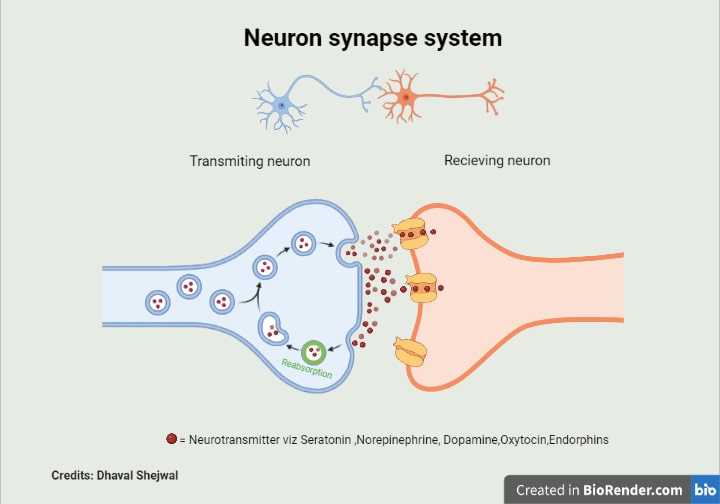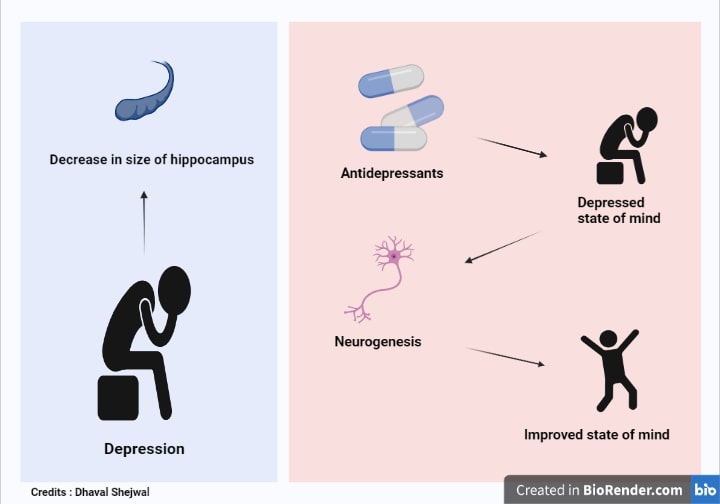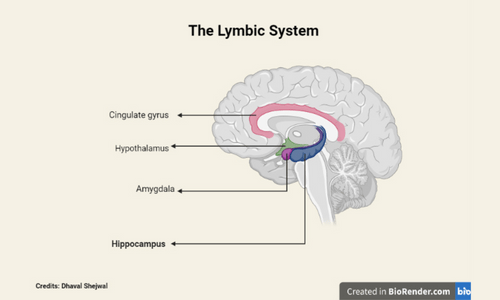~ The role antidepressants play in curing depression
Pair an impressionable mind like mine with the heightened representation of mental illnesses in mainstream media and I find myself in an inconsequential cycle of self-diagnosis and overthinking, like most kids on the internet. This influx of information and excessive romanticism can definitely cause you to be acutely self-aware, to a fault almost – but it can also help in acknowledging your problems and exploring different avenues to seek solutions to the same. From Dear Zindagi’s Kiara slowly recognizing her abandonment issues through Dr. Jug’s therapy sessions to Eat Pray Love’s Elizabeth Gilbert taking off on a yearlong journey of spiritual awakening to fight her hyper fixation on being in a relationship – different people with different problems and resources opt for different solutions. Struggling with depression can materialize itself in multiple ways – a sense of detachment from and disinterest in your everyday life and hobbies, lethargy and prolonged periods of inexplicable sadness amongst other things. And although we have come a long way normalizing seeking professional help in matters of mental illnesses, a strong stigma around any medical interference still prevails. Personally too, when I sought talk therapy, I didn’t mind long or frequent sessions at all but I was adamant about no involvement of any antidepressants or drugs, because I feared an emotional dependency or intense side effects. So, is this skepticism reasonable?
Often people fail to realize the intensity of depression by passing it off as a phase of “just not feeling good” or prolonged laziness. While the symptoms could be simply feeling disengaged or lethargic or lacking enthusiasm, it might actually be indicative of changing brain structure or concerning genetic tendencies. Largely depression was assumed to be caused due to a serotonin deficiency, the brain’s ‘happy chemical’, in your body. Serotonin is a neurotransmitter, which is a chemical released at one end of a neuron and received at the receptors at the adjacent neuron. Once all the required serotonin is taken up by this receiving neuron, any remnant, floating around in the synapse (the space between these two neurons) is then reabsorbed by the transmitting neuron. This exchange, a prime example of chemical coordination via electric signals, maintains a balance to help you feel your happy emotions and construct your happy thoughts. Other happy chemicals include norepinephrine, dopamine, oxytocin (released upon physical intimacy) and endorphins (released upon exercise and bodily movement) – all of which are neurotransmitters behaving in a similar fashion.

Several antidepressants work on the principle of limiting the reabsorption of these neurotransmitters, helping their effects of relief and joy last longer. These include antidepressants like SSRIs (selective serotonin reuptake inhibitors) – which limits serotonin reuptake, SNRIs (serotonin and norepinephrine reuptake inhibitors), limiting serotonin and norepinephrine reuptake and NDRIs (norepinephrine and
dopamine reuptake inhibitors) which limit norepinephrine and dopamine reabsorption. However, a serotonin deficiency being the sole cause of depression was ruled out quickly because contrary to our expectations, efforts to boost serotonin levels didn’t work for every individual suffering with depression.
Another common pattern in the brain structures of depression patients was a relatively smaller limbic system region, especially the hippocampus– the part of the brain responsible for memory and emotional response. These deteriorating cell connections and dying cells could be triggered by stress and anxiety. It was observed that when new neurons grew in this region, patients could gradually ease their way out of their sickness and begin to feel some momentum again. It was further
explained that some of these antidepressants, including SSRIs actually help in neurogenesis (the formation of new neurons), which is why they sometimes take long to yield therapeutic results.
Yet there is an entire bracket of people suffering from depression for whom antidepressants like SSRIs and SNRIs simply don’t work. Sometimes they are prescribed other antidepressants like SARIs or older anti-depressants like tricyclics and MAOIs (monoamine oxidase Inhibitors). SARIs (serotonin antagonist and reuptake inhibitor), unlike SSRIs don’t just inhibit the reuptake but also limit
serotonin molecules from binding onto unnecessary receptors on the receiving neuron. Tricyclics and MAOIs are few of the oldest antidepressants which are often only recommended if the newer ones fail to work, because of their multiple side effects. These might include dry mouth, insomnia, weight gain, constipation or diarrhea, changes in sex drive, amongst others.
Although tricyclics work quite similarly to SSRIs, MAOIs work by inhibiting the enzyme monoamine oxidase which breaks down any residual serotonin. They can however cause a dangerous buildup of serotonin in the cells, leading to the serotonin syndrome, whose symptoms include increased heartbeat, high fever, irritability, shivering and heavy sweating among others.

Side effects have always been a major cause of concern when it comes to opting for antidepressants – when BoJack Horseman’s Diane Nguyen, expressed how she was worried of the potential weight gain and the brain fog or how she was unable to concentrate on her writing and produce anything that could hold up, it resonated with a lot of people. Weight gain could be because some antidepressants block the histamine receptors in your brain, which then meddles with your appetite and satiety levels –so you may continue feeling hungry even after your usual food intake, and this you continue eating more and more in an attempt to satisfy yourself. Some of these medications might also have prolonged “creep” effects which is why sometimes weight gain sustains for longer than expected. However, since we know so little about what exactly causes depression and how these antidepressants truly help, our apprehensions around any sort of medical interference in matters of our nervous and endocrine system is completely understandable. But how do we even
know that it’s the right time to opt for antidepressants or mood stabilizers as a part of your treatment?
At a smaller scale certain everyday practices like being mindful of what you’re eating, exercising regularly, journaling and spending time not only with loved ones but also just by yourself, can be great mood boosters. Seeking therapy too can be a major step towards acknowledging and attending to your depression – for example, by choosing CBT or cognitive behavioral therapy you can help yourself actively analyze your current outlook towards life, your shortcomings (including any self-
sabotaging patterns) and your strengths and responsibilities. And you can put yourself on the path of healing and working on yourself to get better by incorporating the necessary changes in your life. However, when your mood disorders start to interrupt and interfere with your everyday functioning or your lack of any feelings reach an extent of severity of utter numbness or suicidal thoughts start to prevail you ought to consult a mental health professional and ask for medication to bring you out of your current state of distress.
To conclude, matters of the mind remain super sensitive and no mechanism is a one stop for all solution. Life can be incredibly overwhelming sometimes (most times) and it’s okay to take some time off, to take a breather and figure out how you want approach it head on. This article does not intend to provide any diagnosis or promote the use of clinical drugs and anti-depressants to cure depression – we only hope to help create awareness and remove stigma that continues to shadow mental
health issues. If you’re suffering from depression or know someone who is, please consider seeking professional help.
References:
- https://www.webmd.com/depression/how-different-antidepressants-work
- https://www.webmd.com/depression/features/antidepressant-effects
- https://www.nhs.uk/mental-health/talking-therapies-medicine-treatments/medicines-and-psychiatry/antidepressants/overview/#:~:text=It's%20thought%20they%20work%20by,linked%20to%20mood%20and%20emotion.
- https://www.nhs.uk/mental-health/talking-therapies-medicine-treatments/medicines-and-psychiatry/antidepressants/sideeffects/#:~:text=Serotonin%20syndrome%20occurs%20when%20the,antidepressant%20or%20St%20John's%20wort.
- https://www.youtube.com/watch?v=GOK1tKFFIQI
- https://www.youtube.com/watch?v=GAC9ODvSxh0
- https://www.youtube.com/watch?v=S-NukJp_Nbs&t=161s
. . .
Writer
Maedhika Malhotra
Illustrator
Dhaval Shejwal
Editor
Thara Bastian Antony

